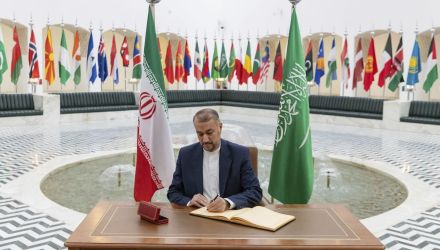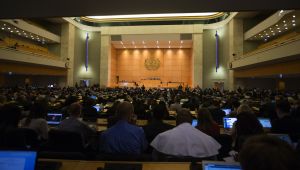Note
This op-ed was reprinted in the International Herald Tribune on December 19, 2005, as "A More Assertive Role for China."
THE SIX-PARTY TALKS created to resolve the North Korean nuclear problem have lost momentum again. All six parties agreed on a denuclearization statement in September, but when the United States started imposing sanctions on North Korean enterprises suspected of counterfeiting and money-laundering, Pyongyang declared that it would boycott future talks. With the two countries at odds again, the denuclearization agreement remains an empty promise, raising the question: Is this framework of six-party talks sustainable for achieving a nuclear-free Korean Peninsula?
The talks will be sustainable only if they create a negotiation model that can maximize the common denominator of regional security and stability. It is thus crucial for China to transform its role from a neutral mediator to a more assertive one that will be able to tame the two "veto" parties — Pyongyang and Washington — and reorient the talks to the long-term interest of regional security and economic prosperity.
The merits and the shortfalls of being a mediator are all about neutrality.In the previous rounds, Beijing successfully projected itself as an impartial broker between Pyongyang and Washington. This effort served well to engage North Korea without interfering with its domestic affairs. But impartiality also prevented Beijing from exerting greater influence to achieve the final deal, and any perceived shift of the balance invited the blame that Beijing had stepped away from its mediation role and its "nonintervention" policy.
Taking on the role of a more active negotiator will give Beijing a free hand to steer the substantive negotiations between Pyongyang and Washington, whose interests hardly meet. Beijing can be more effective by joining the circle of Pyongyang and Washington to negotiate the substance instead of remaining in the outer circle to facilitate the talking process.
As a negotiator that can put its own interests on the table and influence the outcome, China should initiate a road map that affords equal importance to ending North Korea's nuclear weapons program and satisfying its security and economic needs. The road map must include a timetable and the reciprocal compromises Pyongyang and Washington should make at each stage. The road map must be based on full consultation with Pyongyang and Washington, but China should be ready to throw its weight if either side refuses to engage in a "give-and-take." Pyongyang cannot afford to lose its position as Beijing's protégé, and Washington has to think twice before letting Pyongyang's nukes slip away from Beijing's controlling hand.
The current focus on dismantling Pyongyang's nukes magnified the disparities among the six parties and enabled Pyongyang to expand its bargaining power. Also, the nuclear issue is obscuring other common concerns such as Pyongyang's economic development, the unification of the Korean Peninsula, and an institutionalized security dialogue mechanism based on the six-party talks framework.
With a negotiator's role, China can lead the talks to a solution conducive to the long-term interest of regional security and development. If China can expand the talks into the big picture of regional prosperity and diversify the cards each party can play, not only can it splinter the differences, but it can also create the opportunity to promote reforms in Pyongyang just as happened to China two decades ago, ending the de facto war status on the Korean Peninsula through a peace treaty, and galvanizing a new cooperation in Northeast Asia. In other words, China can help nurture a regional environment that makes Pyongyang's denuclearization necessary.
By initiating a road map and acting as a negotiator to implement it, China can increase its effectiveness in helping to resolve North Korea's nuclear problem, and this is something only China can do. Embracing a new negotiation model to expedite the solution of this issue works to the advantage of the world, and to China's own advantage as a responsible regional player and reemerging world power.
Jason Qian is a fellow at the Harvard Negotiation Project of Harvard Law School. Anne Wu is a research fellow at the Belfer Center for Science and International Affairs at Harvard University's Kennedy School of Government.
Wu, Xiaohui (Anne) and Jason Qian. “China's Role in North Korea.” The Boston Globe, December 19, 2005




